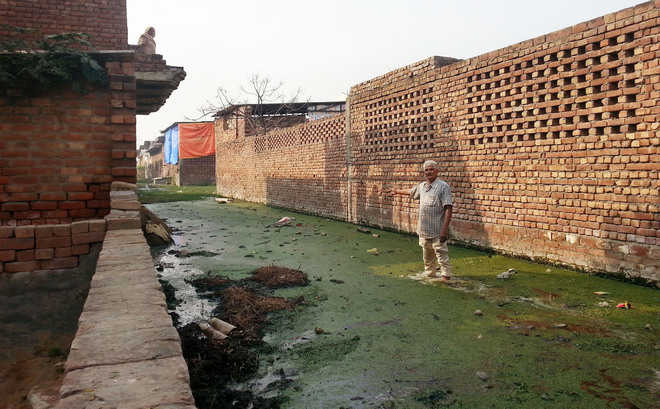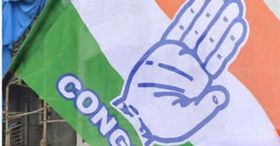
A Nanak Pindi resident stands knee-deep in a pool of sewage in Jalandhar Cantonment constituency. Tribune Photo
Aparna Banerji
Located amid lush-green fields, the Jamsher dairy complex looks incongruous, a desolate wasteland in the back of beyond. Bad roads, pools of stagnant water and alleys inundated with sewage – the promise of making it a “state of the art” locality has sunk without a trace.
The complex is among the three ills that plague the rural areas of Jalandhar Cantonment constituency, the others being the proposed solid waste treatment plant (STP) at Jamsher village and the water treatment plant at Pholariwal. The “people-unfriendly” threesome has triggered a series of protests by the villagers against the state government.
Satpal, a 60-year-old Nanak Pindi resident, says agitatedly, “Our villages have turned into a dump. Should we live in this hell or simply die?” With a jump, he crosses a concrete fence dividing the street from the flooded alley and stands knee-deep in a stinking pool of sludge. “This dung-heavy water is not only spreading diseases but also eating into the foundations of our houses.” He tells us that the villagers have lost count of the politicians and officials they’ve met over the issue. “Pargat Singh (sitting MLA) came here a few years ago. Sarabjit Makkar (Akali candidate) visited recently. They all know about our problems, but have failed to come up with any solution,” he says.
His neighbour, Inderjit Singh, who owns a dairy, wants to be heard too. He shouts, “The mosquitoes don’t spare us even in the winter. Our skin is covered with rashes and boils.”
The flooded street has snapped their access to each other. In the monsoon, say residents, the water enters their houses as well. The villagers claim that their metal utensils, wire meshes and taps rust within months due to the toxins from the two “ganda nullahs” flowing near the complex, which has over 300 dairies.
Shifted to the complex over a decade ago, the dairy owners are a disillusioned lot. They call themselves the government’s forgotten vote bank, conveniently pushed out of the city with promises of development that were never fulfilled.
Anil Chander, an entrepreneur, says, “We are residents of urban areas who have set up dairies here. Initially, some roads were built, but the kutcha ones are clogged with sewage. Some of us also built houses here, only to realise later that it’s just not feasible to live in such surroundings.”
The proposed STP has added fuel to the fire. The hot-button issue became the prime reason for Pargat’s exit from the SAD as he took up the cudgels on behalf of the villagers. Kanwaljit Kaur, sarpanch of Chitebani village, had threatened to immolate herself last year if the government went ahead with the project. She refuses to budge from her stand: “We won’t allow any politician to enter our village unless they give a written undertaking that the STP will be scrapped. Stray animals plunder our crops, the dairy waste chokes our streets and now they want to dump garbage here. We will die before letting that happen. We are backing Pargat because he took on the government for our sake.”
To make matters worse, drugs have made inroads into the area in the past few years. Former Jamsher sarpanch Harinder Singh Bittu Shah says, “In the past year, at least seven villagers have succumbed to drugs. And that bad disease (AIDS) has also reared its ugly head. Seven years ago, the Sadar police station from the city was shifted here. Ironically, the drug menace has tightened its grip since then. We don’t know what the cops are doing.”
The voters of the constituency’s urban area have a different set of problems. Their long-pending demands: abolition of ‘undue’ octroi, access to a peripheral road and mobile connectivity.
The cantonments of Jalandhar and Ferozepur are the only ones in the state where octroi is still being levied. “We’ll get it abolished” — several politicians have used this line to woo voters ahead of one election after the other. The promise was made by SAD candidates Jagbir Brar and Pargat Singh in the 2007 and 2012 Assembly poll, respectively. Both won; it was the voters who lost faith.
As per information obtained under the RTI Act, octroi to the tune of over Rs61 crore has been collected from residents over the past decade. Harvinder Setia, a trader, says, “Octroi was abolished across 133 MCs as per the state government’s 2006 gazette notification, which instead levied 10 per cent surcharge on VAT. In a 2008 notification, Jalandhar and Ferozepur Cantonment Boards were also exempted from paying it. However, dual charges are being imposed on us illegally.”
The boundary walls erected by the Army near Dhina village and on a stretch at Hallotali village have restricted the movement of commuters between the urban and rural areas. The structures have also blocked the link roads meant for inter-village connectivity. Locals have been fighting for access to the phirni road for the past many years, with over 100 RTI applications being filed. For the time being, they have no option but to make a detour of 6 km or more to reach their destination.
Ram Sehdev, a local entrepreneur, says, “We have been let down by all parties. Pargat did make efforts regarding the peripheral road, but he drew a blank over his 16-point manifesto. We have even approached the Centre in vain. It all boils down to political will, which is lacking.”
In the age of smartphones, cantonment residents are heavily dependent on the landline. Reason: This is a high-security area where private mobile phone towers are a no-no. Still stuck in the 20th century? Yes, many of them do feel that way at times.



























